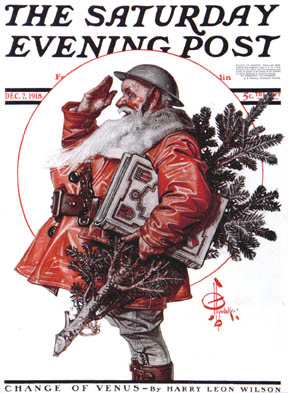It is interesting to note in this day and age when Christmas shopping can be done on a device you hold in your hand and whatever it is you buy can be shipped to your home without you ever getting dressed what it was like 97 years ago as the U.S. government grappled with the idea of another Christmas at war.
The year was 1918 and war was raging in Europe. As wars went, it was a ugly as could be. It had been four years since the Christmas truce of 1914 but Christmas for 1918 was looking anything but peaceful. In fact, the war during the summer of 1918 looked endless.
The American war effort was so absorbing that the gift buying public all but gave up hope of a normal Christmas season altogether in 1918. In July, the National Council of Defense declared all hands on deck to support the war effort. The only sort of gift that could be given that year, these Cabinet members decreed, was war bonds and stamps.
The government had been calling upon the citizenry during the war to make various sacrifices, such as observing meatless and wheatless days…and for the most part, merchants and consumers complied with the requests without grumbling.
 But a proclamation that would result in children receiving bonds and stamps in place of dolls and sleds simply went too far. And what is normally the busiest, hence most profitable, time of year for business would have been a financial disaster. The government, despite the war effort, had to amend its policy.
But a proclamation that would result in children receiving bonds and stamps in place of dolls and sleds simply went too far. And what is normally the busiest, hence most profitable, time of year for business would have been a financial disaster. The government, despite the war effort, had to amend its policy.
In backing down from its July proclamation, the government announced that the guidelines were amended based on assurances from the nation’s retailers that certain restrictions would be observed. These included inducing customers to shop early and to purchase only utilitarian items for gifts—except for presents to be given to children.
“Every child in the United States will rejoice over the decision of the National Council of Defense in the Santa Claus case,” a Chicago Herald and Examiner editorial says in response to the decision.
The guidelines called upon the public to “spread the period of holiday purchases over the months of October, November and December—thus relieving the transportation facilities from the usual heavy congestion during the latter half of December, and releasing thousands of extra holiday employees for war industries.”
Merchants were asked to make note of the policy in their ads starting in early September. A Times ad on Sept. 21 placed by Coulter’s at Seventh and Olive, offered handkerchiefs for sale, exhorting the public to “buy for Christmas.”
A Sept. 30 ad in the Los Angeles Express depicts Santa Claus saluting Uncle Sam. The headline is: “Santa Claus Has Enlisted in the Service of Uncle Sam—and so Christmas Shopping Begins Now.” Uncle Sam is quoted as telling Santa what the shopping rules are for the 1918 Christmas season, concluding: “And be sure to emphasize that all packages to be mailed or expressed must be under way by Nov. 30.” The ad continues: “ ‘Righto,’ says Santa Claus….‘From now on I take my orders from you. And now folks won’t you cooperate with me that I in turn may cooperate with Uncle Sam?”
Putting on extra help at Christmas time or extending business hours was precluded, under the guidelines, and customers were to be asked to carry their own packages, if possible.
How far we have come, you could say. Today’s shopping antics seem to be the war zone….and without any kind of government prompting at all, the media detests and demonizing anyone coming out with an Christmas ad in September.
What kept all of this from being more than the mere historical footnote that it is was the armistice signed on November 11th of 1918 – which effectively ended the war and saved the 1918 Christmas shopping season.









